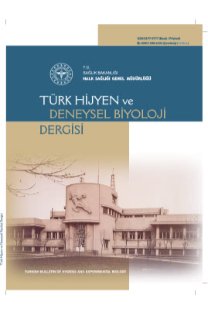Fasciola hepatica'nın endoskopik olarak çıkarılması: bir vaka
Fasciola hepatica koyun yetiştiriciliği yapılan ülkelerde sıklıkla görülen bir zoonozdur. F. hepatica enfeksiyonu erken dönemde ateş, karın ağrısı ve eozinofili ile karakterizedir. F. hepatica nadiren bilier tıkanıklık ve iktere neden olur. Vakamız, Türkiye’nin kuzey kıyı şeridinde bir şehir olan Giresun’dan karın ağrısı ve ikter nedeniyle gelen 22 yaşında bayan hastadır. Nedeni araştırmak için yapılan batın ultrasonu ve laboratuvar testlerinde; proksimal koledokta genişleme ve tubuler ekojenite ile karaciğer enzimlerinde yükselme görülmüştür. Endoskopik intrahepatik safra kanallarında minimal genişleme ve hilusta heterojenöz dolma defekti görülmüştür. Biliar sfinkterotomi uygulanmış ve F. hepatica balon kateter ile çıkarılmıştır. Bu vakada endoskopik retrograd kolanjiopankreatografi ERCP ’nin fasiyoliyaz tanı ve tedavisinde önemli bir role sahip olduğu görülmüştür
Anahtar Kelimeler:
Fasciola hepatica, safra tıkanıklığı, ERCP
Endoscopic extraction of Fasciola hepatica: a case report
Fasciola hepatica infection is a zoonosis mostly encountered in the sheep-raising countries. The early phase F. hepatica infection is characterised by fever, abdominal pain and eosinophilia. The biliary obstruction and icterus are rarely caused by F. hepatica. Our case was a 22-years old female, from Giresun, a north coast city of Turkey, who applied because of icterus and abdominal pain. To analyse the problem abdominal US and laboratory tests was performed which showed dilation in the proximal of choledochal and tubuler echogenites and elevated hepatic enzymes. Endoscopic retrograde cholangiopancreatography showed minimal dilatation of intrahepatic bile ducts and heterogenous filling defect in the hilus. Biliary sphincterotomy had been applied and F. hepatica had been removed by balloon catheter. This case report showed that endoscopic retrograde cholangiopancreatography ERCP has an important role in the diagnosis and the treatment of biliary fascioliasis
Keywords:
Fasciola hepatica, biliary obstruction, ERCP,
___
- Jones MK, Mcmanus DP. Trematodes. In: Murray P, Baron EJ, Jorgensen JH, Landry ML, Pfaller MA, eds. Manual of Clinical Microbiology. 9th ed, Washigton, DC. ASM Press, 2007: 2175-87.
- Adel AFM. Trematodes and Other Flukes. In: Mandell GL,Bennett JE, Dolin R, eds. Principles and Practice of Infectious D, 7th ed, Philadelphia, : 2954-6.
- Bahcecioglu IH, Ataseven H, Aygen E, Coskun S, Kuzu N, Ilhan F. Fasciola hepatica case with hemobilia. Acta Medica, 2007; 50: 155-156.
- Taheri MS, Aminzade Z, Shokohi SH, Birong SH, Aghazade K. Hepatobiliary Fascioliasis: Clinical and Radiological Features. Iran J Parasitol, 2007; : 48-55.
- Moghadami M, Moradni M. Fasciola hepatica: A cause of obstructive jaundice in an elderly man from Iran. Saudi J Gastroenterol, 2008; 14: 208- doi: 10.4103/1319-3767.43279
- Tuna Y. Endoscopic management of biliary fasciolosis. Cumhuriyet Med J, 2011; 33: 469- 72. DOI: http://dx.doi.org/10.7197/cmj.v33i4
- Deveci U, Öztürk T, Üstün C. Radyolojik Olarak Tanı konulan Pediatrik Fasciola hepatica Olgusu. Turkiye Parazitol Derg, 2011; 35: 117-9. DOI: 5152/tpd.2011.29
- Şakru N, Korkmaz M, Demirci, Kuman A, Ok ÜZ. Fasciola hepatica infection in Echinococcosis suspected cases. Turkiye Parazitol Derg, 2011; 35: 80. doi:10.5152/tpd.2011.20
- Ozer B, Serin E, Gümürdülü Y, Gür G, Yılmaz U, Boyacıoglu S. Endoscopic extraction of living Fasciola hepatica: Case report and literature review. Turkish J Gastroenterol, 2003; 14: 7.
- Echenique-elizonde M, Amandarain J, Lironde de Robles C. Fascioliasis: An exceptional cause of acute pancreatitis. J Pancreas, 2005; 6: 39.
- ISSN: 0377-9777
- Başlangıç: 1938
- Yayıncı: Türkiye Halk Sağlığı Kurumu
Sayıdaki Diğer Makaleler
Esra ÖZKAYA, Seray TÜMER, Özlem KİRİŞCİ, Ahmet ÇALIŞKAN, Pınar ERDOĞMUŞ
Akut bruselloz tanısında polimeraz Zincir Reaksiyonu yöntemininin kullanımı
Sabahat ÇEKEN, Sedat KAYGUSUZ, Dilek KILIÇ, Canan AĞALAR
Fasciola hepatica'nın endoskopik olarak çıkarılması: bir vaka
Nevzat ÜNAL, Yeliz TANRIVERDİ ÇAYCI, Özgür ECEMİŞ, Ahmet BEKTAŞ, Murat HÖKELEK
